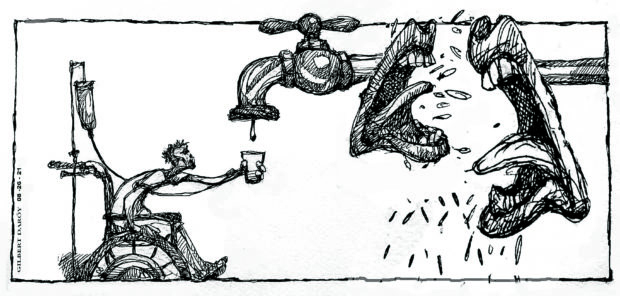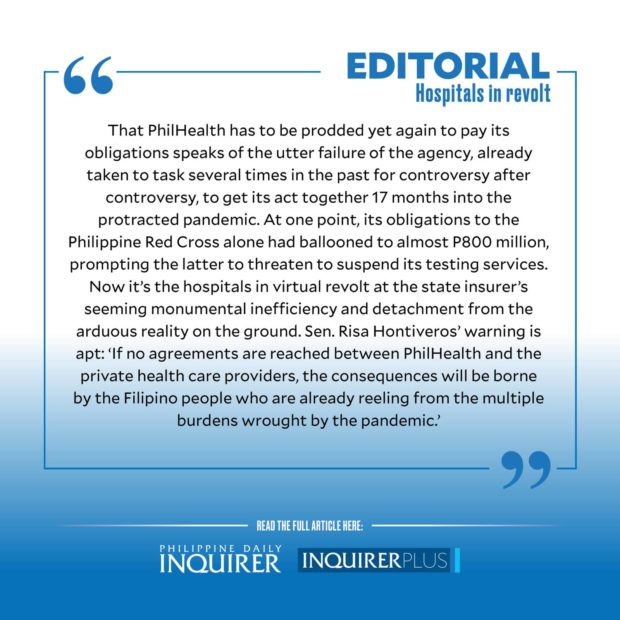Hospitals in revolt

Just as the highly contagious Delta variant is driving up the Philippines’ daily COVID-19 case count to its highest levels since the pandemic struck in March 2020, the country’s largest hospital groups are threatening to “disengage” from the state-run Philippine Health Insurance Corp. (PhilHealth) over billions of pesos worth of unpaid claims.
Pushing these hospitals to the brink of such a drastic action is PhilHealth’s unexpected issuance of Circular No. 2021-0013 last week temporarily suspending the payments of claims to hospitals under investigations “pertaining to fraudulent, unethical acts, and/or abuse of authority.”
The circular was seen as the last straw by hospitals that, earlier in the week, had already slammed PhilHealth for its inability to pay its obligations on time. The Philippine Hospital Association (PHA) decried during a hearing of the House committee on health the alleged “arbitrary denial” of billions of pesos’ worth of claims that has put hospitals in a precarious financial situation. Private Hospitals Association of the Philippines Inc. (PHAP) board member Dr. Gerry Gonzales said they have even come to the point of looking at their expenses to see “if we can pay the salaries of our health workers.”
PHA president Dr. Jaime Almora disclosed that hospitals’ outstanding PhilHealth claims from January 2020 to June 2021 had reached a staggering P86.079 billion. Denied claims alone were estimated at P13.8 billion, representing 619,956 claims and translating to P13.8 million per hospital. That money being withheld by PhilHealth would have been used by hospitals to keep their operations up and running and pay for their frontliners.
“Arbitrary denial of payment, resulting in losses to hospitals, is not only unlawful but also morally wrong,” protested Almora.
PhilHealth said its latest circular was just an update of a directive that has been in place since 2016. It was issued supposedly to conserve the resources of the state-run health service provider and “in the spirit of proper fund management and fraud control.” Per PhilHealth spokesperson Shirley Domingo, “Fraud control is a basic tenet in managing funds. Hence, PhilHealth finds it imperative to implement measures to ascertain the security and sustainability of funds entrusted to it.”
The Philippine Medical Association, the PHA, and the PHAP do not see the circular in that light, however, but as a reflection of PhilHealth’s “mistrust” toward the health care providers that should have been its partners in the bruising battle against COVID-19.
“The bridge between the health-care providers and PhilHealth now has serious cracks caused by a feeling of mistrust by PhilHealth against health-care providers.” the medical groups said in a statement. “The bridge is bound to collapse, maybe it is time to review the engagement with PhilHealth and level the playing field.”
The groups lamented that the circular may just end up as “another ploy to deny or delay the payment of claims” by hospitals, too many of which are already in dire financial straits due to the strain of caring for droves of new COVID-19 patients. They have “listened, tried to understand, pleaded and even worked together with PhilHealth,” the groups stressed, but the state insurer has not been cooperative: “PhilHealth is just too far at the other end of the bridge to hear the pleas of health-care providers.”
Malacañang has directed PhilHealth to immediately pay what it owes the private hospitals, recognizing that the hospitals’ “disengagement” would be a disaster, derailing the provision of universal health care to Filipinos right in the middle of the gravest public health emergency in the country’s history. Both houses of Congress have also called on the two sides to iron out their differences for the sake of Filipinos who depend on PhilHealth to cover their medical needs.
That PhilHealth has to be prodded yet again to pay its obligations speaks of the utter failure of the agency, already taken to task several times in the past for controversy after controversy, to get its act together 18 months into the protracted pandemic. At one point, its obligations to the Philippine Red Cross alone had ballooned to almost P800 million, prompting the latter to threaten to suspend its testing services. Now it’s the hospitals in virtual revolt at the state insurer’s seeming monumental inefficiency and detachment from the arduous reality on the ground.
Sen. Risa Hontiveros’ warning is apt: “In the midst of a public health crisis, Filipinos need safety nets in public health emergencies, as well as a financial cushion on the cost of hospitalization. If no agreements are reached between PhilHealth and the private health care providers, the consequences will be borne by the Filipino people who are already reeling from the multiple burdens wrought by the pandemic.”





















